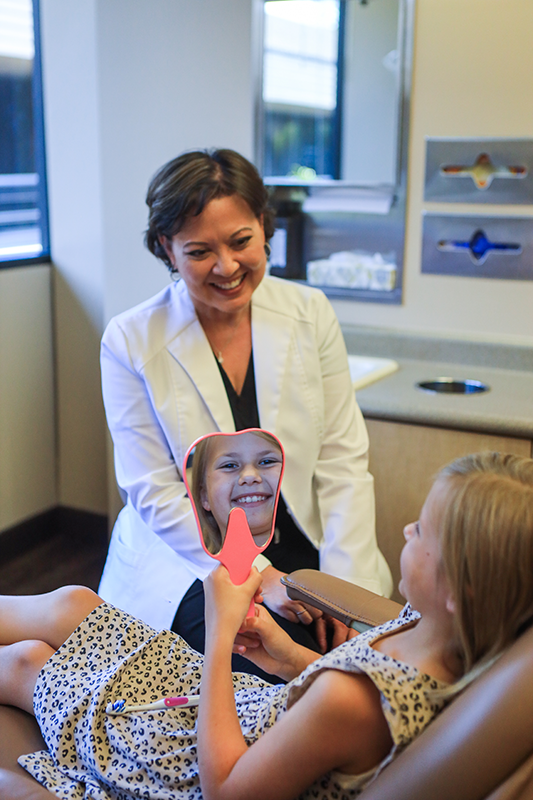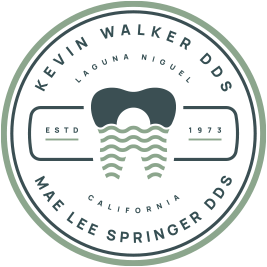Everything You Need To Know About Caring For Your Child’s Smile
 Your Child’s First Visit
Your Child’s First Visit
At Kevin Walker, DDS & Mae Lee Springer, DDS, we recommend that your child has their first dental visit by their first birthday. Around this age is when the first teeth begin to erupt. It is very important to us that we make your child’s first visit as positive and enjoyable as possible. We want your child to enjoy getting to know our doctors and staff, and be comfortable at all times. A pleasant, comfortable first visit builds trust and helps put your child at ease during future dental visits. Children should be encouraged to discuss any fears or anxiety they feel.
Teething
The first teeth begin to erupt between 6 to 12 months of age. Until about age 3, the gums are sore, tender and irritated. You can help to alleviate the discomfort by rubbing sore gums gently with a clean finger, the back of a cold spoon or a cold, wet cloth. Avoid using teething biscuits, as they contain sugar that is not good for baby teeth. Instead, we suggest using a teething ring to sooth sore gums.
Preventing Baby Bottle Tooth Decay
While your baby is teething, it is important to monitor the teeth for signs of baby bottle decay. Here are some ways to avoid and prevent early tooth decay:
- Examine the teeth, especially on the inside or the tongue side, every two weeks for dull spots (whiter than the tooth surface) or lines.
- Avoid giving your infant a bottle with sugary liquids while they sleep, as it can cause decay. We recommend water. The sugar in the liquid mixes with bacteria in dental plaque, forming acids that attack the tooth enamel.
It is important to know that every time your child drinks liquids containing sugar, acids attack the teeth for about 20 minutes. When awake, saliva carries away the liquid, but during sleep, the saliva flow significantly decreases and liquids pool around the child’s teeth for long periods, covering the teeth in harmful acids.
A Child’s First Dental Visit
A child’s first dental visit to Kevin Walker, DDS & Mae Lee Springer, DDS should be scheduled around his/her first birthday. The most important part of the visit is getting to know the doctors and staff, so your child will be comfortable on future visits. A pleasant, comfortable first visit builds trust and helps put the child at ease during future dental visits. If possible, allow the child to sit in a parent’s lap in the exam room.
Infant’s New Teeth
Primary, or “baby,” teeth play a crucial role in dental development, as they are vital to development of the jaws, and for guiding the permanent (secondary) teeth into place (starting around age 6).
Since primary teeth guide the permanent teeth into place, infants with missing primary teeth or infants who prematurely loose primary teeth may require a space maintainer, a device used to hold the natural space open. Without a maintainer, the teeth can tilt toward the empty space and cause permanent teeth to come in crooked. Missing teeth should always be mentioned to your family dentist. The way your child cares for his/her primary teeth plays a critical role in how he/she treats the permanent teeth. Children and adults are equally susceptible to plaque and gum problems—hence, the need for regular care and dental check-ups.
Infant Tooth Eruption
A child’s teeth actually start forming before birth, and as early as 4 months of age the primary teeth begin to push through the gums - the lower central incisors are first, followed by upper central incisors. The remainder of the 20 primary teeth typically erupt by age 3, but the place and order varies.
Starting around age 6, permanent teeth will begin to erupt, typically starting with the first molars and lower central incisors. This process continues until around age 21. Adults have 28 secondary (permanent) teeth - 32 including the third molars (wisdom teeth).
Importance of Primary Teeth
Primary teeth are important for several reasons:
- Good teeth allow a child to eat and maintain good nutrition.
- Healthy teeth allow for clear pronunciation and proper development of speech habits.
- A great and healthy smile boosts self-confidence.
- Primary teeth guide eruption of the permanent teeth.
Good Diet and Healthy Teeth
The teeth, bones and soft tissue of the mouth require a healthy, well-balanced diet. A variety of foods from the five food groups help minimize (and avoid) cavities and other dental problems. We do not recommend sugary snacks, as these cause tooth decay. Instead, children should eat healthy foods like vegetables, low-fat yogurt and cheeses, which promote strong teeth.
At Kevin Walker, DDS & Mae Lee Springer, DDS we are dedicated to helping your child get off on the right foot. We want to build a strong, healthy foundation so that your child has a lifetime of great dental health. If you have any more questions on how to care for your infant’s smile or want to schedule their first visit, please contact us at (949) 495-4600.
We look forward to getting to know you!

